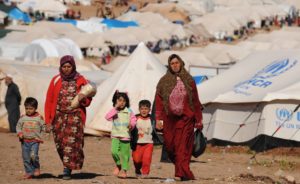Is the world tired of Syrian refugees?
 A raft of new research suggests that early sympathetic sentiments towards displaced Syrian refugees that was prevalent at the beginning of the eight year conflict are begging to evaporate.
A raft of new research suggests that early sympathetic sentiments towards displaced Syrian refugees that was prevalent at the beginning of the eight year conflict are begging to evaporate.
Some researchers argue that since the terror attacks in Paris and London in 2015 and 2017, Syrians have been linked in media and through social media as a threat to Western civilisation.
In 2017, a survey of 1,500 Canadians found 41 per cent wanted their government to stop taking more refugees, and 40 per cent disagreed with how the federal government handled the resettlement of Syrian refugees.
Across the globe, anti-immigrant and refugee sentiments are on the rise. US President Donald Trump triggered a 600 per cent rise of online hate speech, according to technology researcher Prof Nadia Naffi, of Montreal’s Concordia University.
President Trump uses the negative image of immigrants to justify outrageous and inhumane behaviour, Prof Naffi says.
Elsewhere in the world: The anti-immigrant Law and Justice Party gained power in Poland; the UK voted for Brexit; Austria included the far-right Freedom Party in their government, and; the authoritarian anti-immigrant Prime Minister Victor Orban returned to office in Hungary.
And German Chancellor Angela Merkel finally accepted the idea of a migrant border camp after being a strong supporter of integration and resettlement while Giuseppe Conte, Italy’s new Prime Minister, formed a government of a coalition of far-right and Eurosceptic parties, calling for an “obligatory” redistribution of asylum seekers.
And while many Syrians succeeded in escaping the deadly conflicts in Syria, they now face barriers such as labour-market discrimination, residential segregation, xenophobia, racism and social exclusion.
A recent World Bank report on global migration and labour markets says that while migration provides large overall benefits to the host country but bad policies are creating barriers to employment and economic participation.
The Syrian crisis consists of more than the displacement of millions of people. It also includes “overreaction and panic, fueled by a series of misconceptions about who the migrants are, why they come, and what it means for Europe,” according to Daniel Trilling, editor of New Humanist magazine.
He says hate speech propagandists and news media spread many of these misconceptions, and social media propaganda can be a powerful tool for misinformation, harming both refugee groups and host societies.
Feeling excluded and labelled as the enemy can have detrimental consequences on any refugee cohort’s emotional, psychological and productive capacity.
Economist Amartya Sen, of Harvard University, argues that intolerance and racism lead to the waste of productive power. Unemployed and underemployed refugees are at risk of losing their skills and cognitive abilities.
Many become discouraged. Some may lose their self-esteem and suffer from intense mental agony, he says.
Anti-migration propagandists use the prevailing theory that people become prejudiced when they feel threatened.
Prof Naffi says these propagandists are using narratives depicting Syrian refugees as incompatible with Western culture and as a risk to the safety, well-being and political and economic environment of the West.
“They cash in on the lack of contact between host societies and refugees to spread their lies. The lack of contact prevents people from verifying and validating any hypothesis they may have about the ‘Other’,” Prof Naffi said.
“This leads to an increased bias in favour of one’s own group and against all the others. Categorization is a normal psychological process essential to making sense of others’ behaviours. But, it is an excluding act when associated with stereotyping and racism,” she said.
Laurie Nowell
AMES Australia Senior Journalist












